|
Once, when I was pretty young, a neighbor kid refused to play with me because I had tendency to take over things and dictate what we were going to do. The thing in question was reenacting the Battle of Thermopylae. I had just read about a book it, and felt that instead of playing the usual game of Cowboys and Indians, it would be a lot more interesting saving the Western World from Eastern despotism. My friend did not agree. In truth, what he objected to was me being bossy. He mumbled something about those 'damned books' and demanded that he be placed at the head of the Persian army, so he wouldn't have to take orders from me. I obliged him. He wasn't the only person who thought I was something of a "know it all" when I was growing up. The ones who called me that shared something in common in that they never read anything, instead choosing to ground their reality solely on what they observed in the world around them. I just wanted to know what other people thought about it all. I did pick up on their objections though and even now days, older and grayer, when I am trying to explain something, I'll search the eyes of the person I am talking to in order to see how the message is being taken, and most of the time, I have the good sense to shut up when I see my words escaping out of the ear on the other side of their head. I've never intentionally set out to be "a know it all"; I've just always been curious and loved to learn about things I find interesting. My eclectic reading habits have given me the gift of being to synthesize new information from the union of disparate facts picked up from different authors or books. It is not something to brag about because there is nothing magical about it; in fact, it is what usually happens when you make a habit of gathering information from a lot of different sources. And it doesn't have to be books. In coaching, for example, if you watch how three or four different coaches handle a specific situation, you are bound to learn something that you didn't know before you focused your attention on the learning process. Nowadays, I look for a more foundational knowledge. I flew by the seat of my pants through the Sixties and the Seventies, then drove along the more accepted paths at a much slower speed while I raised my children, but as I aged, I began to notice that much of the terrain I traveled daily resembled a movie set with streets lined with facades and lots of extras walking about willy-nilly. I also began to notice that the only thing I could trust to be true 100 percent of the time were the names on the gravestones in the local cemetery. In these troubled times, people would really have to have their head buried in the sand not to notice just how much of our culture profits from destroying, distracting, or diverting our attention away from the moments of clarity that, all to often nowadays, we only seem to gain at the side of a grave. These five books I value not because they are easy to read, or are very entertaining, but because I can use them to provide tangible knowledge in the way that life really is. They help me feel like I'm walking on solid ground. I urge my Christian friends not to criticize for leaving the Bible off the list. Biblical knowledge is foundational too, and I usually gauge what I get from other sources according to how the knowledge fits together with God's word on the subject. 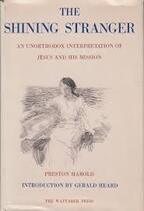 The Shining Stranger: An Unorthodox Interpretation of Jesus and His Mission by Preston Harold Preston Harold was a pseudonym for the author of this amazing book. I bought it in a thrift store for five dollars, one of the greatest bargains in recorded history. The author was a true genius and brought his wealth of knowledge to bear on how Jesus's mission impacted the world historically, economically, politically, culturally, mythologically, scientifically, philosophically, psychologically, and spiritually. He quotes an amazing array of great thinkers on nearly every subject known to mankind which tells me that he was very well read and knowledgeable in a great many areas. One insight he shares is the idea that since life on earth is governed by sunlight, then the laws that govern energy should be able to be aligned with what the Bible says. In a chapter entitled Nature's Supreme Law he talks about how difficult it is to compare the words of Jesus against "the given data in the physicist's realm" because of how physics was still in a transitional phase working out what needs to be kept from the classical period and fitting it into the new realities created by new paradigms created by quantum data. "Jesus could not at once be the symbol of light in action unless a parallel exists between psychic working and the unseen operation of energy in the physical world." This is an exciting perspective because it talks Jesus being an active agent in the material world (history) while at the same time being something from beyond this world (metaphysical). A lot of people get very upset when you speak of Christianity as being rooted in the mythological world. They feel that this makes Christ into a symbol and removes him as a historical figure. Myth doesn't actually mean that. It refers to a narrative that explains the world (sacred) and is therefore important. It doesn't have to mean non-historical. Conversely, historical events can and do also have mythic importance. Our everyday lives are also laden with historical experience of great mythic import. It's a pity that most people have been conditioned by the hucksters not to even want to understand this important little detail. The author points out that teaching the importance of the Second Law of Thermodynamics should be mandatory in our schools. "Just as the Golden Rule bridges the dichotomy between man and society, so the physicist must deal with lone law that fits in both classical or quantum compartment. This law is the Second Law of Thermodynamics." I've later read a passage in Jung's writings that said that pretty much the same thing in how energy and concept of chaos and increasing entropy impacts the psychological processes. Empires fall because the reasons for their existence and their organizational structures cannot keep pace with the changes that their existence constantly create. New sources of energy must be found, the debris of the old cleared away, and new structures created to house the future. I have come to believe that Jesus was talking about the same idea when he told the parable of the Prodigal Son. Jordan Peterson expounds on the same concept in his illuminating insights on the story of the Garden of Eden. I placed this book in the primary position because of a chapter entitled Jesus' Demonstration of Perception and the Psychic Power. The author talks about the period of tribulation, "When 'the powers that are in heaven' are shaken, man confronts in himself in the terrible apparition of madness." "When ye therefore see the abomination of desolation, spoken of by Daniel the prophet, stand in the holy place --whoso readeth, let him understand..." The author states that that the abomination mentioned is insanity standing in the 'holy place' or at the center of man's conception of self and reality. The author then equates this insanity with a "godless intellectualism." The answer to this state of affairs is thus inferred as to keep our thoughts pure and principally concerned with reality and truth because in terms of the individual's role in history, it allows for the production of both fertile ground and good fruit. "In their search for something to believe in, many are caught in strange cults -- and not the least of these is the cult of modern art in which sacrifice of self, in suicide, or wanton recklessness, all to often follows the artist's distortions that tend to extol madness or drive him to it." The book was copyrighted in 1967. The phrase above was in my head when I left the darkness of the theater after watching the movie Joker or even Once Upon a Time in Hollywood. How much of our culture tends to promote this type of madness? 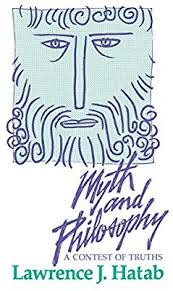 Myth and Philosophy by Lawrence J. Hatab I lost this book for a few days and was searching for it everywhere only to discover it beneath a displaced sofa cushion. I have this idea that to better understand the modern world, we need to go back to where it all started and then beyond that into the influence of the ancient world. This book takes the argument between rationalism and mythology back to where it began when "philosophy" first raised its critique against mythic understanding. One of the red flags that alerted me that there's something serious going here, is how rationalism has mislabeled and sought to mislead mankind on the meaning of mythology. I first ran across myth in the children's section of the local library. That's where rationalists would prefer it stay. To me this suggests that there is something to mythological thinking that terrifies the rationalist thinkers to the point that are willing to lie and become intellectually dishonest in order to suppress what truth it contains. This argument still manifests itself today in the willingness of many empiricists to do their damndest to pretend that the discovery of quantum psychics hasn't shaken their faith in their false idols. They should be telling us about how their faith in reason alone is being tested, instead they go to ever more ridiculous extremes to keep the mysteries chained up in the dungeon. This book is also great in how it explains the difference in the way that ancient Greeks looked at the world and how we look at the world. There is an absolutely stunning passage in the end of the book where Hatab links all modern empirical knowledge back to its mythic roots by saying, "What lies behind knowledge is not a foundation or ground, but rather a mystery, and that no form of thought can ultimately satisfy the requirements of certainty, demonstration, or proof. Rationality, therefore, at a certain point, is much closer to myth than the expectations of traditional philosophy would have ever allowed." I believe that the problem with belief that we now have, hinges on the artificial schism between spiritual knowledge and empirical knowledge that was created by the effort of The Medieval Church to both deny the mythological roots of Christianity and to keep man at the material center of the universe. On the other hand, science insistence on everything being grounded in empirical reality sometimes appears to be the reaction of a young boy who was scolded, embarrassed, and sent out the room. It might behoove them to remember that many of the early scientists grounded their foundational beliefs on the existence of God. Hatab offers an eloquently cogent argument that maybe truth is meant to plural rather than just one thing, an idea that science is just beginning to entertain. After I found it this morning, I took it outside and read the passage I quoted above. I had been looking for those words for a long time and felt uplifted. Instantly two bluebirds flew down from my neighbor's tree and landed on my yard. Life is extremely real and it is also mysterious to the extreme. It's about time that science forgives Christianity for its crimes against Galileo, and it's about time for the Church to apologize for not recognizing the good work that science has done on the behalf of humanity. 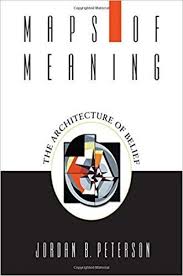 Maps of Meaning by Jordan B. Peterson Many people have a irrational hatred of Peterson. I can't count the times that I've heard his findings dismissed as "banal'. So many times in fact that it seems serve as a perfect litmus test for those who actually read his writings and those who get their opinions from sources that are really banal. He is attacked by people of both sides of the political spectrum. I think that in this day and age, any person who really has something to say that is worth hearing should be . The reason why he is such a formidable debater is that those argue with him usually attack him for saying things he never actually said. They attack him mainly for having the temerity to not agree with their own positions. This book is kind of a hard read, but it is loaded with information that came from years and years of experience in clinical psychology and a lifelong interest in spirituality, mythology, literature, culture, and especially the nature of evil. You can open it to almost any page and learn something new. Peterson recognizes the connections of things as a true polymath should. It was by reading the first chapter of his book the 12 Rules for Life that I began to actually understand the story of the Garden of Eden for the first time and it has very little to do with the way my preacher told the story. 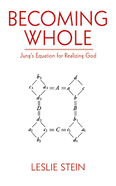 Becoming Whole: Jung's Equation for Realizing God by Leslie Stein Carl Jung spent a lifetime searching for truth. I don't care. Anybody that devotes his/her entire life to the study of truth needs a platform and people need to hear what he/she has to say. Look at all of the people who pay good money to hear what Eminem says, or Stephen A. Smith, or even worse what Quentin Tarantino has to say. These people really don't know shit about anything important. We got it all backwards, and we have had it backwards for a long fucking time. I like reading Jung and about Jung because as a scientist he never gave up on the importance of spiritually to human beings. Many colleges will not teach his discoveries because they believe that spirituality has no place in empirical science. They teach what is better known as biologically based psychology as if mental/emotional issues are no more than the gas produced by a good bowl of chili beans. This is foolishness to the nth degree. It is a more than a little like saying the answer to most mental/emotional problems would be to not eat chili beans. Jung recognized the similarities of his patient's stories to the fairytales the world over thus introducing the idea of the collective subconscious. He all did the research and reported the first findings on the concept of synchronicity. He understood and wrote about the links between myth, literature, religion/spirituality, and psychology a hell of a lot sooner than most others. This book is another hard read because it tackles one of his most difficult efforts, the lifelong project of mapping out the psychological processes where the individual can achieve psychic "wholeness". Jung possessed a wealth of hard earned knowledge and, therefore, is always interesting and enlightening. Leslie Stein had to do yeoman's work to find and digout instances where Jung had written about the various concepts that helped to explain this equation. 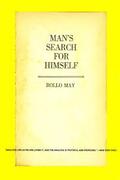 Man In Search of Himself by Rollo May I love this book. It is the first book on psychology that I ever read cover to cover. I picked it up at the worst time of my life after my wife left me, and I was dealing with my father's decline. I knew I needed therapy and couldn't afford it. I found this book in a bookstore, and it immediately opened my eyes to a lot things that were causing me a great deal of anxiety. The part I liked best was in how May explained the sources of the anxiety of post-war society. His prescient insights on modern culture correctly explained the roots of such anxiety and how they would eventually lead us into a world that would come to think of the likes of Quentin Tarantino as an artist, and movie The Joker as art. May is very readable. He explains difficult concepts using simple illustrations. |
Categories
All
|
Proudly powered by Weebly

 RSS Feed
RSS Feed